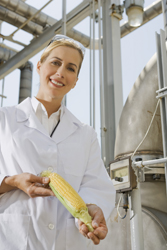Making good use of biodiesel waste
In the quest to reduce dependence on fossil fuels and the associated impact on global climate change and energy security, biodiesel production from vegetable oils for the transportation sector has gained tremendous ground. However, with increasing production of valuable biodiesel, there is now a large excess of one its by-products, glycerol (also known as glycerine). In order to make biodiesel production sustainable, the market requires new uses for glycerol in other advanced liquid fuels, bioenergy applications and green biochemicals. In addition, incorporating the production of such existing and novel substances in an advanced biorefinery concept will enhance the competitiveness of current biodiesel producers. Scientists initiated the EU-funded project GLYFINERY to create just such an integrated and sustainable production process. Research is focused on the development of novel biocatalysts that favour high yields of desired products from glycerol using the majority of the feedstock in the process. Having identified the most promising biocatalytic microorganisms and the fermentation processes for biological conversion, the third and fourth project years have been devoted to optimising the bioprocess design and to developing and optimising the recovery processes. Five potential products were identified during the third year (1,3-Propanediol (PDO), butanol, ethanol, biodiesel and biomethane). Processes for all five were optimised and scaled-up leading to initial pilot-scale tests. Fermentation products were fed into an anaerobic biodigester to recover biomethane. Production and recovery partners collaborated closely on a life cycle assessment (LCA) to develop methods both economically and environmentally sustainable for integration into an advanced biorefinery concept. GLYFINERY has successfully demonstrated the technical, economic and environmental feasibility of converting glycerol to value-added products for sustainable biodiesel production and effective waste management. In the face of a glycerol glut as global biodiesel production continues to increase, the developed technology should have important impact on the competiveness of biodiesel production.







